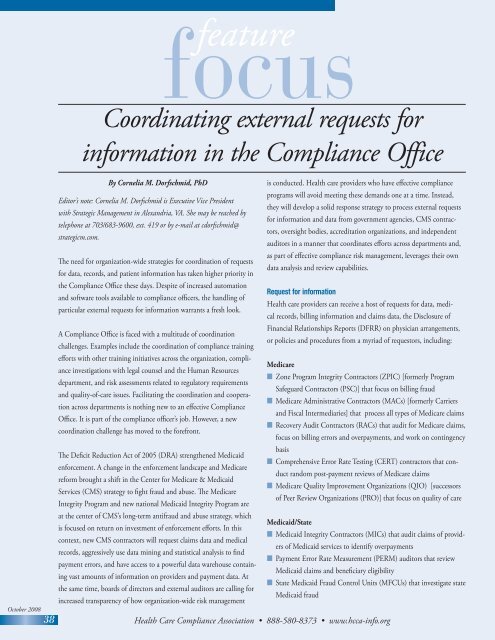Earn CEU credit Cathy Garrey, Connect with your - Health Care ...
Earn CEU credit Cathy Garrey, Connect with your - Health Care ...
Earn CEU credit Cathy Garrey, Connect with your - Health Care ...
Create successful ePaper yourself
Turn your PDF publications into a flip-book with our unique Google optimized e-Paper software.
focus<br />
feature<br />
Coordinating external requests for<br />
information in the Compliance Office<br />
October 2008<br />
38<br />
By Cornelia M. Dorfschmid, PhD<br />
is conducted. <strong>Health</strong> care providers who have effective compliance<br />
programs will avoid meeting these demands one at a time. Instead,<br />
Editor’s note: Cornelia M. Dorfschmid is Executive Vice President<br />
they will develop a solid response strategy to process external requests<br />
<strong>with</strong> Strategic Management in Alexandria, VA. She may be reached by<br />
for information and data from government agencies, CMS contractors,<br />
oversight bodies, ac<strong>credit</strong>ation organizations, and independent<br />
telephone at 703/683-9600, ext. 419 or by e-mail at cdorfschmid@<br />
strategicm.com.<br />
auditors in a manner that coordinates efforts across departments and,<br />
as part of effective compliance risk management, leverages their own<br />
The need for organization-wide strategies for coordination of requests<br />
data analysis and review capabilities.<br />
for data, records, and patient information has taken higher priority in<br />
the Compliance Office these days. Despite of increased automation<br />
Request for information<br />
and software tools available to compliance officers, the handling of<br />
<strong>Health</strong> care providers can receive a host of requests for data, medical<br />
records, billing information and claims data, the Disclosure of<br />
particular external requests for information warrants a fresh look.<br />
Financial Relationships Reports (DFRR) on physician arrangements,<br />
A Compliance Office is faced <strong>with</strong> a multitude of coordination<br />
or policies and procedures from a myriad of requestors, including:<br />
challenges. Examples include the coordination of compliance training<br />
efforts <strong>with</strong> other training initiatives across the organization, compliance<br />
investigations <strong>with</strong> legal counsel and the Human Resources<br />
Medicare<br />
n Zone Program Integrity Contractors (ZPIC) [formerly Program<br />
department, and risk assessments related to regulatory requirements<br />
Safeguard Contractors (PSC)] that focus on billing fraud<br />
and quality-of-care issues. Facilitating the coordination and cooperation<br />
across departments is nothing new to an effective Compliance<br />
n Medicare Administrative Contractors (MACs) [formerly Carriers<br />
and Fiscal Intermediaries] that process all types of Medicare claims<br />
Office. It is part of the compliance officer’s job. However, a new<br />
n Recovery Audit Contractors (RACs) that audit for Medicare claims,<br />
coordination challenge has moved to the forefront.<br />
focus on billing errors and overpayments, and work on contingency<br />
basis<br />
The Deficit Reduction Act of 2005 (DRA) strengthened Medicaid<br />
n Comprehensive Error Rate Testing (CERT) contractors that conduct<br />
random post-payment reviews of Medicare claims<br />
enforcement. A change in the enforcement landscape and Medicare<br />
reform brought a shift in the Center for Medicare & Medicaid<br />
n Medicare Quality Improvement Organizations (QIO) [successors<br />
Services (CMS) strategy to fight fraud and abuse. The Medicare<br />
of Peer Review Organizations (PRO)] that focus on quality of care<br />
Integrity Program and new national Medicaid Integrity Program are<br />
at the center of CMS’s long-term antifraud and abuse strategy, which<br />
Medicaid/State<br />
is focused on return on investment of enforcement efforts. In this<br />
n Medicaid Integrity Contractors (MICs) that audit claims of providers<br />
of Medicaid services to identify overpayments<br />
context, new CMS contractors will request claims data and medical<br />
records, aggressively use data mining and statistical analysis to find<br />
n Payment Error Rate Measurement (PERM) auditors that review<br />
payment errors, and have access to a powerful data warehouse containing<br />
vast amounts of information on providers and payment data. At<br />
Medicaid claims and beneficiary eligibility<br />
n State Medicaid Fraud Control Units (MFCUs) that investigate state<br />
the same time, boards of directors and external auditors are calling for<br />
Medicaid fraud<br />
increased transparency of how organization-wide risk management<br />
<strong>Health</strong> <strong>Care</strong> Compliance Association • 888-580-8373 • www.hcca-info.org

















